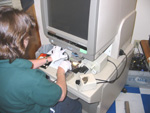Records center strives to inform staff on proper storage
by Matthew DouglasPublic Relations
The University Records Center will sponsor an open house from 9 a.m. to 2 p.m., April 23, at 4295 Arco Lane in North Charleston.
 Kimberly
Warren, a microfilm technician, performs quality control work on microfilmed
images.
Kimberly
Warren, a microfilm technician, performs quality control work on microfilmed
images.
The open house is being held in observance of Records and Information Management Month. Tours of microfilm and records storage will be given every hour on the hour with the final tour at 1 p.m.
“The goal of the open house is to inform MUSC and others about our services and help those people better manage their own records,” said Business Services Manager Roy Dingle.
In the mid 1970s, the record center was nothing more than an old two story house filled with boxes upon boxes of patient records, research findings and other such documents. An employee of records management for 26 years, Cathy Hyatt remembers how records used to be kept at the university. “There was one large room with 20,000 boxes of records dating back to 1900 locked inside a steel cage, and the roof leaked!” said Hyatt.
Today, the record center has evolved into a modern, efficient facility thanks to a $1.3 million overhaul by the university. The University Records Center now services more than 150 departments at MUSC and has combined all support services into one location. The center also utilizes digital technology to keep and record various records instead of stacking boxes of paper in warehouses.
“This is important because the state and federal government have regulations in place about how long records must remain before they can be destroyed. For example time cards must be kept for three years, while autopsy and dental records must be stored permanently,” Dingle said.
“We want to show administration and staff how to update their own records and inform them about the laws in place about how long they must keep records and the proper way to dispose of the records once that time has come. It will save them a lot of time and money.”
“The day of the file cabinet is over,” Dingle said. “We are systematically migrating to a hybrid strategy that will change the way customers retrieve recorded information. It’s a change that can revolutionize record keeping.”
The hybrid system will scan paper documents sim-ultaneously to microfilm and/or CD-R disks. Permanent records will be stored on microfilm and CD-R disks distributed to customers. CDs will be formatted and indexed allowing files to be retrieved using field searches. Overall customers dependency on microfilm readers will be reduce and archival and retention integrity maintained.
Directions: Take I-26 to West Montague Exit. Turn left onto Thomasina Gaillard Blvd. at the Sports Café. Turn left onto ARCO Lane. The building is on the right and parking is inside the fenced area.
For information, contact Cathy W. Hyatt, at 554-4102.
Catalyst Online is published weekly, updated as
needed and improved from time to time by the MUSC Office of Public Relations
for the faculty, employees and students of the Medical University of South
Carolina. Catalyst Online editor, Kim Draughn, can be reached at 792-4107
or by email, catalyst@musc.edu. Editorial copy can be submitted to Catalyst
Online and to The Catalyst in print by fax, 792-6723, or by email to petersnd@musc.edu
or catalyst@musc.edu. To place an ad in The Catalyst hardcopy, call Community
Press at 849-1778.